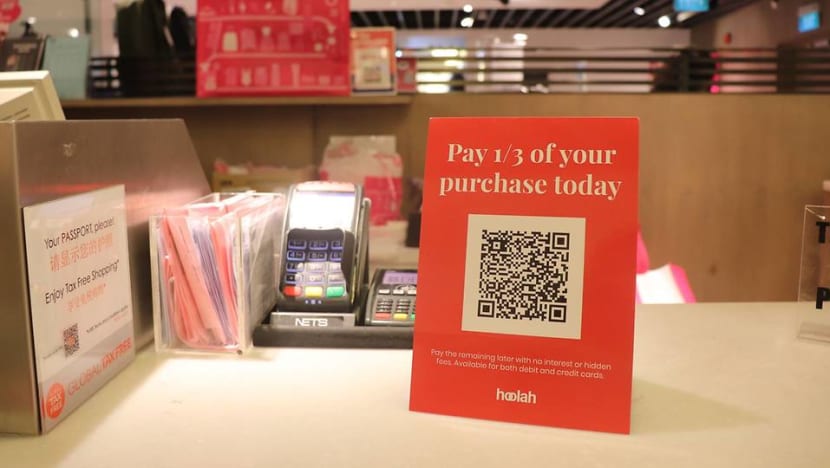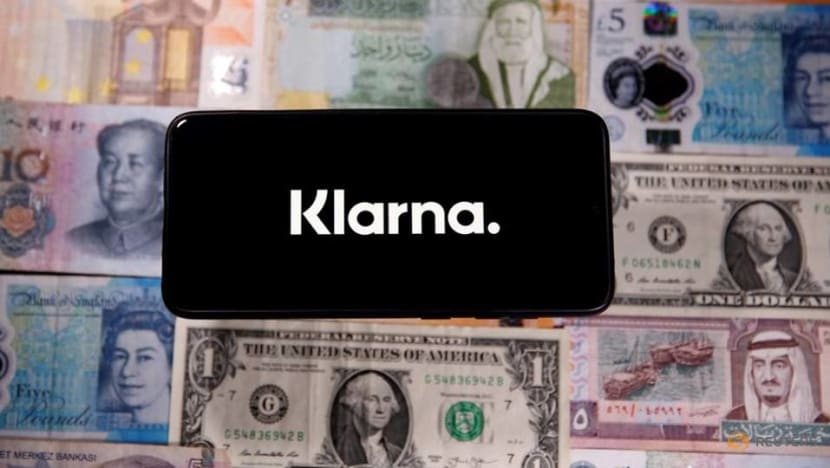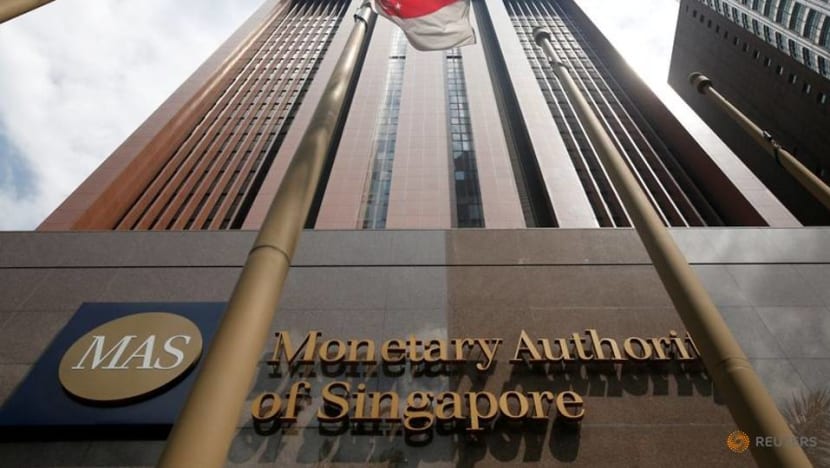Pay for shoes in instalments? ‘Buy now, pay later’ shopping gaining ground in Singapore

So-called "Buy now, pay later" services like hoolah allow individuals to pay for their purchases over time without interest or service fees charged. (Photo: hoolah)
SINGAPORE: Ms Doleries Kwok was about to complete her purchase for a pair of Adidas slip-on shoes on e-retailer Zalora when she noticed a new payment option.
It was a “buy now, pay later” (BNPL) service called Rely, which could split the S$90 payment into three equal monthly instalments with no interest or service fees.
This was new to Ms Kwok. She asked around; none of her friends had tried it either. Even though she did not need to pay for her new shoes via instalments, she decided to give it a go, tempted by a S$20 cashback for first-time users.
The next step to create an account with Rely took mere minutes. All she had to do was key in personal details like NRIC, contact number, address and choose a preferred debit or credit card, and the instalment plan was in place.
“It was convenient,” she told CNA. “I initially thought there might be some catch to it, like a membership fee, because to be able to split into interest-free instalments sounds too good to be true.”
“But there was no membership fee involved. Just create an account will do.”
SMALL BUT GROWING INDUSTRY
Ms Kwok is among a small but growing group of shoppers here who have given BNPL schemes a shot.
Simply put, these are short-term payment plans that allow individuals to make a purchase and pay for it over time. Instalments are not a foreign concept, but BNPL services allow one to split the cost for small-ticket everyday items, without interest fees and without having to own a credit card.
This alternative payment method, primarily for e-commerce, has seen red hot growth in overseas markets, especially Australia, Europe and the United States, for some time now, although it is starting to stir concerns among some regulators about the ease with which shoppers can make purchases.
A recent report by US financial technology leader FIS said BNPL accounted for 2.1 per cent of global e-commerce transactions in 2020. This is expected to double to 4.2 per cent by 2024. Global BNPL services include Sweden’s Klarna, which is now Europe’s most valuable start-up with a valuation of US$31 billion, and Australia’s Afterpay.

Singapore is playing catch-up to the growing trend, as it sees its own crop of homegrown players.
Two new providers – OctiFi and Pace – entered the market last year despite the COVID-19 pandemic, joining Rely which was the first mover in 2017, as well as hoolah and Atome which have been around since 2018 and end-2019, respectively.
The same report from FIS said BNPL is the fastest-growing online payment method in Singapore. Currently accounting for just 3 per cent of the market, it is on track to grow to 13 per cent by 2024.
The four players that CNA spoke to – Atome, hoolah, OctiFi and Pace – said they have had more users and merchants coming on board. Rely turned down CNA’s interview request for this article.
Atome, for instance, now has 100,000 users, with growth at 20 per cent a month.
Other players declined to reveal specific numbers – Pace would only say its users are “in the thousands” while hoolah said it saw “phenomenal” growth of 400 per cent last year. Age-wise, the bulk of BNPL users are between 18 and 35 years old.
The pandemic is one reason for this unabated growth, as more turned to selling and shopping online, BNPL players said. It also helped that the market in Singapore has grown more comfortable with digital payment options and innovation by start-ups.
Beyond e-commerce checkouts, BNPL players said they also see demand from retailers to have this option in stores.
“Not everyone can sell online. As things return to normal, many of the smaller merchants are keen to find new ways to get customers back,” said OctiFi’s founder Ed Chin.
READ: Buy now, pay whenever? Lockdown lift for online shopping loans
In addition, instalments seem more attractive to consumers during tough times, as an alternative to getting what they want while managing cash flows, said Atome’s chief executive officer David Chen.
Local BNPL players are generally offering three interest-free, equal monthly payments for shoppers at retailers that range from fashion, beauty, furniture to electronics. Anyone above the age of 18 with a debit or credit card can create an account.
There are no account or other sign-up fees for now, but users who fail to make their instalments in time will have their accounts frozen and face penalties.
Providers have varying late-fee penalties. For instance, Atome charges a S$20 administrative fee if a payment is missed. If this fee and the outstanding payment are not paid within seven days, an additional S$10 fee is imposed, subject to a cap of S$60.
Some others base it on transaction sizes, like hoolah charges a S$15 late-payment fee for orders between S$100 and S$999.99. The fee is S$5 for those below S$100 and S$30 for orders above S$1,000.
There are also no sign-up or platform fees for merchants. In fact, BNPL firms pay merchants in full, absorbing all of the credit risk, except for an approximate 4 to 6 per cent cut at the point of sale.
“There is no risk for merchants (as) merchants receive the total payment for any orders upfront once the product is sold,” said hoolah’s co-founder and chief executive officer Stuart Thornton.
Through their services, BNPL companies said they are helping consumers to buy what they want while enabling retailers to boost sales.
On the latter, hoolah said those it partnered have reported a 20 to 40 per cent jump in average on conversion and order sizes, while Pace noted that some of its merchants saw 15 to 20 per cent more sales within the first 30 days.
“An item may have been too expensive previously but by splitting payment into three, the item is now more affordable and customers can manage their cost,” said Pace’s founder Turochas Fuad. “And by doing so, we have increased the sales orders for our merchants.”
JUST ANOTHER DEBT?
But questions about the BNPL model have emerged, such as whether consumers may be spending more than they can afford and hence chalking up unnecessary debt.
Regulators in the United Kingdom and Australia are reviewing or tightening rules around the emerging industry.
The UK government said last month that it will introduce rules for BNPL credit, such as requiring providers to make affordability checks before lending to a customer.
The Australian Securities and Investments Commission is actively monitoring the sector and has raised concerns about how one in five BNPL consumers were missing payments and some were facing financial hardship.
READ: Americans take to 'buy now, pay later' shopping during pandemic, but can they afford it?
Mr Anton Ruddenklau, partner and head of financial services at KPMG Singapore, said BNPL services have raised an “ethical dilemma”.
“It’s so easy now to buy on instalment so there’s a question if BNPL is supporting customers to buy what they want, or are they making a market and encouraging people to buy more,” he explained.
“Are we encouraging people to have unaffordable lifestyles? Are we encouraging people to go into debt although they may not see it as debt and just see it as three easy payments?”
Overseas regulators have also pointed out that BNPL services are attracting “vulnerable customers” due to a “very basic” credit risk assessment in place, Mr Ruddenklau added.
REGULATIONS IN SINGAPORE?
In Singapore, the Monetary Authority of Singapore (MAS), along with other government agencies, is “reviewing the appropriate regulatory approach” for BNPL schemes, the Business Times reported last month.
The central bank has reached out to the industry for information on their business and developments in this space. It is unable to share a specific timeline for the conclusion of its review, a spokesperson told CNA.
MAS noted that BNPL schemes have gained prominence over the past year in Singapore and elsewhere, meaning that the potential benefits and risks for consumers have become “more relevant”.
While convenient, consumers “may be at risk of spending more than what they have budgeted for” when using BNPL services. “Where consumers are not careful and overspend, such schemes can still result in overstretched finances and cause potential financial distress,” said the spokesperson, who urged consumers to bear in mind that BNPL plans are “still debts to be repaid” with late fees and charges imposed if repayments are missed.

MAS added that should a regulatory framework be needed, it will be “risk-proportionate and evenly applied across providers so as to effectively mitigate risks to consumers”.
“Steps taken by the industry to address such risks will be taken into account, as will potential benefits that BNPL schemes could bring to consumers and businesses,” it said in its emailed response.
One measure that regulators could be considering is to ensure data-sharing between BNPL firms and other entities such as credit agencies and mainstream lenders, according to KPMG Singapore’s Mr Ruddenklau. Another is to require standardised affordability checks for BNPL schemes.
How these products are being promoted could also be another area for regulators to look into, he said, citing developments in Australia that require retailers to highlight traditional payment methods on their websites first before BNPL options.
“What they are asking is for BNPL to not be the default payment mechanism. They want to give customers an informed choice (with) the right type of advertising otherwise it might shift unfairly to people who don't necessarily understand the product or are not well-positioned.”
READ: Capital One stops 'risky' buy-now-pay-later credit card transactions
Mr Ruddenklau added: “What regulators, including MAS, are saying is BNPL is not a bad product, it just needs to be shaped in a way to ensure that people don't get to unsustainable levels of debt.
“Or people who are taking out a loan are doing it in a way that they can afford, so it doesn't affect give them a bad credit rating in the future.”
MANAGING RISKS
Local BNPL firms told CNA that they have been in touch with the authorities and are welcoming of any regulation.
“We want to build a healthy and sustainable business for the long term … and I believe that regulation in a way protects us. Because without it, it will encourage bad players who don’t look after the interests of consumers or merchants,” said Atome’s Mr Chen.
The four players that CNA spoke with said safeguards are in place. These range from in-house risk management systems and internal assessments, to imposing a credit or buying limit to each customer in order to minimise the risk of bad debt.
For instance, Pace puts a S$1,500 cap on debit card purchases and a S$3,000 limit on credit card transactions.
“The idea about fintech is cheaper, better, faster and so we are a bit more relaxed compared to the banks for example,” said Mr Fuad.
“We will take on some risks – but not crazy risks … As much as we can, we use data and credit history that we can get to prevent people from using (our platform) to buy anything beyond their means.”
Mr Thornton stressed that hoolah is focused on “responsible affordability” and the company has rejected “transactions when we think people are moving towards the wrong direction”.
“We’ve done that purposely to show that we are not like those old consumer finance-type companies where revenue or profit is made from people’s inability to pay back,” he said.
So far, the late payment rate at Atome has been less than 1 per cent, with the average overdue amount being less than S$30. The start-up said it is able to keep this number low as it closely monitors payment behaviours and will suspend users with irregular payment history or too many concurrent transactions.
For the others, missed repayments have been “extremely low” or “insignificant”.
BNPL players also said they tend to offer users a grace period before issuing late-payment penalties. In some cases, these fees do get waived when users’ circumstances are taken into account.
“We designed our services with consumers being top of mind,” said OctiFi’s Mr Chin. “So we generally offer work-out plans if consumers are falling behind and we always try to waive our fees to help.”
COMPETITION HEATING UP
Nevertheless, signs are pointing to continued growth in this trend, with bigger fintech firms or even the banking incumbents either jumping in or forging partnerships.
Pace said it has partnered OCBC to offer its BNPL service to the bank’s debit cardholders, while the fintech arm of gaming hardware and software firm Razer teamed up with Rely to provide BNPL services in Southeast Asia.
Incumbents are moving to maintain their relevance, said Mr Ruddenklau.
“You may get lower interests and lower margins, but the data coming from these transactions have value in their own right … So the banks are making a bet that over time, they will retain relevance against an industry which is growing very quickly,” he explained.
BNPL players are confident that they can hold steady on their turf through innovation and attracting more merchants. Having a different positioning to target slightly bigger-ticket items is also a way out for younger players.
“Some of these bigger-ticket items could be healthcare-related or in the home service segment … These are purchases that are north of S$1,000 or S$2,000 – that’s not usually where our competitors are in so we have been trying to grow in this area,” said OctiFi’s Mr Chin.
Overseas expansion is on the cards for most of them as well.
Atome is already available in almost all of Southeast Asia, as well as Hong Kong and China. It is aiming to be “deeper” in each of these markets by building up its merchant and user base, said Mr Chen.
Having expanded into Malaysia and Hong Kong, hoolah is keeping an eye on Thailand and other parts of North Asia moving forward.
For Pace, which is already available in Malaysia, Thailand and Hong Kong, it intends to venture into North Asia by the next quarter.
“Asia remains under penetrated compared to other markets, with no one single brand that covers the entire Asia-Pacific. So it’s definitely not a crowded market yet,” Mr Fuad said.
















